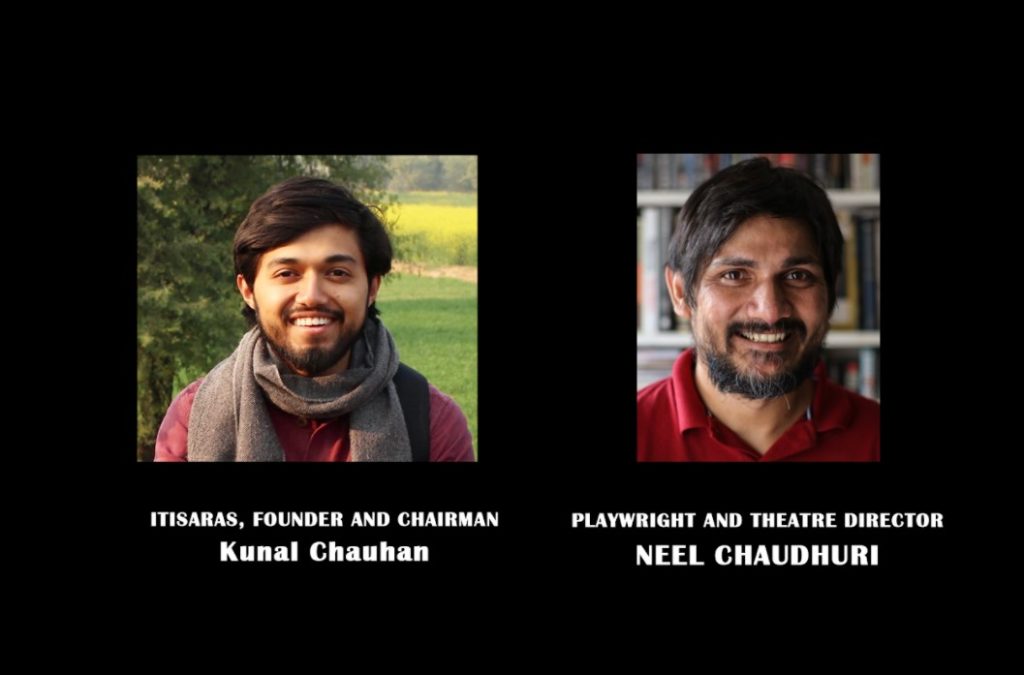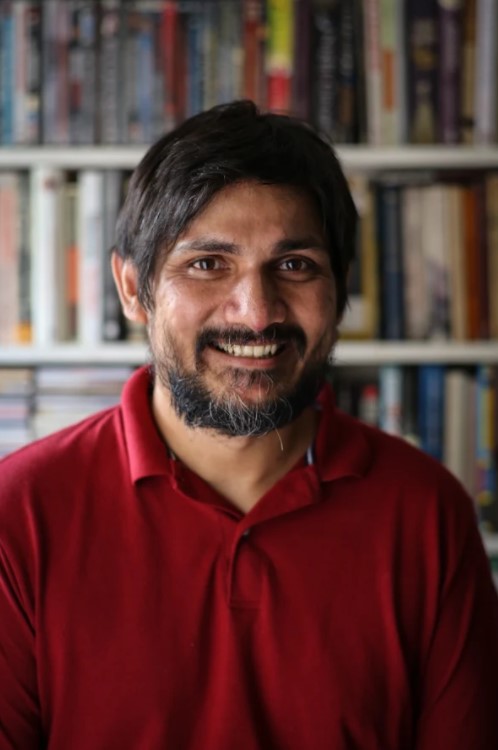
Theatre as a performative art form has had a rich history in India. According to some scholars, Indian theatre emerged in the 15th century BCE. Vedic text such as the Rigveda provides evidence of drama plays being enacted during Yagya ceremonies. The dialogues mentioned in the texts range from one person monologue to three-person dialogue.
During the freedom movement theatre was used as a form of resistance and political awakening of the masses. In recent years theatre has been called a dying art form with its audiences reducing over the years. Very few people now choose to go to the theatres.
Kunal Chauhan the founder of ITISARAS interviewed Mr Neel Chaudhury a playwright and theatre director, recipient of the Vinod Doshi fellowship, the Aditya Vikram Birla Kala Kiran Puraskar and the Shankar Nag Puraskar. They discussed the challenges the theatre community faces in general in India and how it has been impacted to an extent during the pandemic and the resulting lockdown. The theatres have been shut for the past year.
Neel talks about how the theatre community consists of actors, writers, directors many technicians who work with lights, sounds and costumes. There is a whole community of small shopkeepers, vendors, blue-collar workers, theatre owners whose livelihood depended on the theatre actors and people coming to watch theatre. These people’s lives have been deeply impacted.

According to him, “Theatre is one of the most resilient art forms. It has been challenged by other modes of expression and entertainment.” He pointed how since its very inception, the theatre had been challenged by many of its contemporaries like television, cinema, multiplex culture and now online streaming platforms like Netflix, Hotstar and Amazon Prime.
Even after all these things, theatre till now has still managed to survive and moreover, nowadays younger people are coming forward looking for a career in theatre not only as actors but also technicians, writers, directors etc.
Neel then goes on to talk about the type of content produced in theatres. He says that because of the limited audience of theatres and theatre community being extremely closed, theatre has always been experimental in the type of productions they do. They have had many more chances of pushing the boundaries and broadening their horizons, politically and otherwise. But now, like all other fields theatre too would be producing content about the lockdown, the new themes being about isolation, longing and loneliness. This theme can be not just for Indian audiences but people worldwide as everyone had been privy to this life in the past year.

In the interview, Neel goes on to talk about how the pandemic has also positively affected the theatre. He says “There are several people who have found greater access to not just the plays and the performance but also to conversation and dialogue around theatre.” Now, a lot more people have been able to access theatre because of it being available online. Things like theatre workshops, theatre meetings and even plays are now happening online and more people are watching them.
“The act of gathering in a shared space, the liveness of the performance is at the root and the essence of theatre. When these are taken away, there are multiple challenges”. The essence of theatre obviously gets lost because of this. It’s not the same when people watch theatre over their systems. People are not able to watch theatre right now with their family and friends. But after the pandemic is over, theatre will benefit from the new audience that it has accumulated. Neel talks about how artists and audiences are desperate to come back to theatres.

But not a lot of young struggling college-going artists have access to high-speed internet and laptops. These young artists also suffering because right now they are not able to gain from the experiences of their theatre seniors.
In the final leg of the interview, Neel Chaudhuri talked about community theatre ‘Aagaz’, a collective of which he is a part.
He says how Aagaz had been facing various political and financial challenges for the past few years because it is a company that is not just limited to performative art but are involved in various other social welfare activities. The pandemic has obviously increased their financial and infrastructural challenges but has given them a new resolve to help and work with the communities impacted by the disease.
Neel says, “A very small percentage of the budget is allocated to the Ministry of Culture and a huge percentage of that goes to NSD, museums etc. That is the outlook of the state in times of ‘stability’. It is clear that during a pandemic or a crisis their priority would not be supporting arts and artists.” He also talks about how cinema gets an additional burden of unfair censorship to clamp down on creativity. This is obviously a reflection of how our society views art as a profession and how not much value is given to it
Neil asks the common art enthusiasts and fans of the art form to go in multiple numbers and support this art form. Theatre needs the support of its fans now more than ever.
The interview ended with Kunal informing Neil about the initiative taken by ITISARAS to support the artists during these testing times. ITISARAS has started a petition requesting the Ministry of Culture to provide some assistance to people associated with theatre and carve out policies specially designed for them.
Click below to watch the full interview:
The fate of the performing arts sector is so very significantly entwined with our daily lives- stimulating our creative passions and allowing us to reconnect with traditions, allowing us respite from drab days. To showcase our gratitude in these onerous times, Itisaras has started a petition on change.org (http://chng.it/zhFTnGdPMm) – urging the Ministry of Culture to extend support to artists, performers and technical staff- to the people employed in this industry, and support for the art itself. Please support us in this endeavour to propel this industry which impacts millions of people by signing and sharing it across all platforms.


